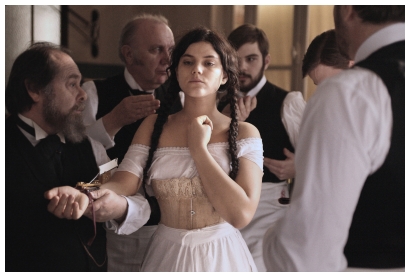
 Let no one say that French director Alice Winocour isn't audacious. She chooses not only to make her debut film -- which she also scripted -- a period piece, but to use it as a conduit for some trenchant observations on class, sexuality, and gender. Based on true events, Augustine tells the tale of the titular kitchen servant -- played by the singer Soko -- who is brought to an asylum after suffering a strange seizure that leaves her paralyzed on one side. Placed in the care of Dr. Jean-Martin Charcot (Vincent Lindon) -- whom Sigmund Freud would eventually cite as a major influence -- the young Augustine becomes the 19th century equivalent of a media sensation, her near-orgasmic fits under hypnosis staged for the edification (and entertainment) of French society.
Let no one say that French director Alice Winocour isn't audacious. She chooses not only to make her debut film -- which she also scripted -- a period piece, but to use it as a conduit for some trenchant observations on class, sexuality, and gender. Based on true events, Augustine tells the tale of the titular kitchen servant -- played by the singer Soko -- who is brought to an asylum after suffering a strange seizure that leaves her paralyzed on one side. Placed in the care of Dr. Jean-Martin Charcot (Vincent Lindon) -- whom Sigmund Freud would eventually cite as a major influence -- the young Augustine becomes the 19th century equivalent of a media sensation, her near-orgasmic fits under hypnosis staged for the edification (and entertainment) of French society.
I got to sit down with Winocour to discuss this richly realized and slyly subversive debut. We explore the complex process of recreating a time when a predominantly male medical establishment still regarded female "hysteria" with a mix of fascination and fear, and examine how she sculpted this true story into an enthralling allegory for both the class struggle and male/female politics. Click on the player button to hear the interview, or right-click the title to download.
